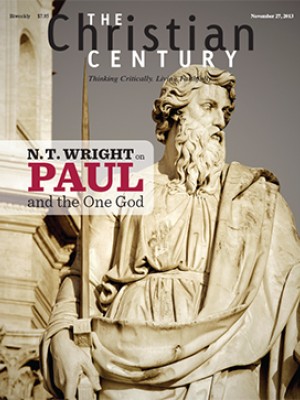Bishop challenges ban on gay nuptials
Retired bishop Melvin Talbert of the United Methodist Church, who shared a jail cell with Martin Luther King Jr. and whose ministries included leadership in national ecumenical bodies, became in late October the first UMC bishop to bless publicly a same-sex union in a church.
Growing numbers of U.S. clergy in the global United Methodist Church, which convenes every four years, have vowed to perform gay weddings in violation of the denomination’s long-standing definition of homosexual conduct as “incompatible with Christian teaching.” Some clergy are facing charges or are likely to soon.
Read our latest issue or browse back issues.
Talbert declared at the close of the 2012 Methodist general conference that the church’s official position “is wrong and evil, no longer [calling] for our obedience.” Other bishops urged Talbert to cancel plans to bless a union of two gay men on October 26 in an Alabama church.
Whether Talbert stands to lose his credentials or not is uncertain. The couple was already married September 3 in Washington, D.C., where same-sex weddings are legal.
Joe Openshaw and Bobby Prince, both in their fifties, wanted an additional church ceremony among friends and family in the Birmingham, Alabama, area. More than 100 attended the service held at Covenant Community Church in Center Point, a congregation affiliated with the United Church of Christ, which blesses same-sex unions.
The couple had “a celebration of love,” as reported by religion writer Greg Garrison for the website al.com. Talbert signed a certification of marriage not binding according to state law but significant to the couple, according to the United Methodist News Service.
“These are two men, created in the image of God, loyal United Methodists, servants of Jesus Christ and in love with each other,” said the bishop in the ceremony.
In an interview with the news service Talbert said he was “at peace and ready to face the future—whatever that holds—as well as complaints being filed against me.” Ministers convicted in a church court could lose their clergy credentials. Church law censures only those who violate church law, not those who simply disagree with church teachings.
The denomination’s Judicial Council, which concluded a four-day session October 26 in Baltimore, did not change church policies on gays and lesbians. But the Methodists’ highest court did approve a resolution from New York that lauds congregations that “provide for the pastoral needs of same-sex couples” in the denomination.
Talbert suggested that the celebrations, covered by television stations and other media, “will move us toward equality in the church. Little by little, it’s going to change.”
In the 1970s, Talbert held prominent positions in the Methodist bureaucracy, including the post of general secretary of the denomination’s General Board of Discipleship from 1973 until 1980, when he was elected a bishop and served the Seattle area for eight years. He was then named bishop of the San Francisco area, serving until his retirement in 2000, and also serving as president of the National Council of Churches from 1996 to 1999.
Although a diplomat in wider church circles—he was ecumenical officer for the Methodists’ Council of Bishops and president of the Churches Uniting in Christ in the first years of this century— Talbert was outspoken on social justice issues, including gay rights.
As a college student in Nashville, Tennessee, he was involved with the Student Nonviolent Coordinating Committee (SNCC) and helped plan the first student sit-in demonstrations in Atlanta in 1960. SNCC invited Martin Luther King Jr. to join student demonstrations, and he was arrested with them. Talbert spent three days and nights in the same jail cell with King, an experience he said has shaped his life.





